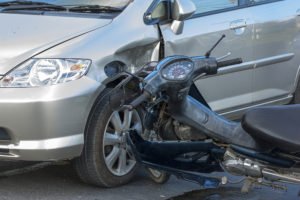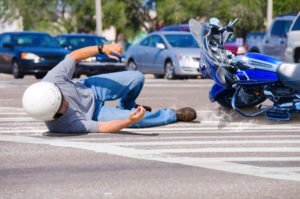
Motorcycles are at a greater risk of accidents, and the resulting injuries are often more severe. The National Highway Traffic Safety Administration (NHTSA) stated that 13 out of every 100,000 cars are involved in a fatal accident, compared to 72 out of 100,000 motorcycles.
At The Law Place, we have over seventy-five years of combined experience when it comes to managing car accidents and motorcycle accidents across the state of Florida. Our law firm is skilled at helping people to handle the trauma of accidents, and we know that we can help you too.
We have an in-depth understanding of traffic law, and our motorcycle accident lawyers in Tampa, FL, can answer all of your questions. The phone lines to our office are open twenty-four hours a day, seven days a week.
Contact The Law Place on (941) 444-4444 to schedule a free consultation today.
Comparing Car and Motorcycle Accidents
Motorcycle accidents often result in more severe outcomes compared to car accidents. This is largely due to motorcycles having only two wheels, lacking safety features like airbags and seatbelts, and being significantly smaller than other vehicles on the road. The absence of an enclosing structure means that motorcyclists are not protected by metal doors and frames, increasing their vulnerability in crashes.
Furthermore, motorcycles face a higher risk of accidents due to their limited visibility to other drivers, reduced stability, and greater susceptibility to road hazards such as rocks, mud, and debris. The consequences of motorcycle accidents can be particularly dire, including:
- Motorcyclists typically sustain more severe and lasting injuries due to their exposed position.
- Victims of motorcycle accidents often require extensive financial resources for medical treatment, especially for injuries like spinal cord or brain damage.
- In legal proceedings, motorcyclists may encounter biases, with some jurors perceiving them as more prone to risky or reckless behavior.
- Those injured in motorcycle accidents may need substantial compensation to cover medical expenses and long-term income loss.
- Motorcycle crashes frequently result in the tragic wrongful death of the rider and any passengers.

Motorcycle Accident Statistics
Research and statistics highlight the risks associated with motorcycle riding:
- The likelihood of death from a motorcycle accident is about 30 times higher than that from a car accident.
- Riders over the age of 40 are approximately 20 times more likely to be injured in a crash than car drivers of the same age.
- Younger motorcyclists, under the age of 30, face a risk of fatal injury 36 times higher than their car-driving counterparts.
- While motorcycle accidents result in injury or death in 8 percent of cases, car accidents do so 20 percent of the time.
- Motorcycles account for 2 percent of all registered vehicles but represent 5 percent of all highway fatalities.
 We’re here to serve you. Our phones are open 24 hours a day.
We’re here to serve you. Our phones are open 24 hours a day.
Car Accident Statistics
- The US Department of Transportation (USDOT) states that an average driver will be involved in a motor vehicle accident every 6 years and that a driver will get close to an accident once or twice a month.
- In the year 2005, there were 39,189 motor vehicle fatalities throughout the nation, including 27,472 drivers and 10,036 passengers that suffered a fatal injury.
- The National Safety Council states that over 12 million motor vehicle accidents happen every year, involving 20 million motor vehicles.
- Statistics prove that over 2 million car accidents result in disabling injuries every year.
- Studies have shown that close to 75 percent of people who have suffered an injury in a car accident will still have symptoms for over 6 months after the crash.
- A study by the National Highway Traffic Administration stated that up to 28 percent of people in motor vehicle accidents would suffer a minor to moderate injury, and close to 6 percent of people in motor vehicle accidents will suffer a severe or fatal injury.
 We’re Florida’s top litigation team with over 75 years of combined experience
We’re Florida’s top litigation team with over 75 years of combined experience
Common Causes of Car Accidents
More than 11 million car accidents happen every year in the United States.
The most common causes of car accidents are:
- Distracted Driving – The National Safety Council (NSC) reported that 25% of car accidents are related to drivers using a mobile phone.
- Driving Under the Influence of Alcohol or Drugs and Speeding – Drunk driving and speeding are associated with half of all car accidents.
- Aggressive Driving – Behaviors of aggressive driving include failure to yield, weaving in and out of lanes, tailgating, and disregarding traffic signals.
- Driver Fatigue – 2.5% and 3.0% of fatalities in traffic are caused by drivers falling asleep at the wheel and driver fatigue in the United States.
 From the initial call to updates on your case status, we are here to get you answers.
From the initial call to updates on your case status, we are here to get you answers.
Common Causes of Motorcycle Accidents
Motorcycle accidents often stem from several common scenarios:
- Left-Turn Accidents – Motorcyclists are particularly vulnerable when cars make left-hand turns. These collisions frequently occur at intersections, during attempts to overtake a car, or while trying to pass a vehicle. The smaller size and quicker speed of motorcycles can catch car drivers off guard, leading to accidents.
- Lane Splitting – This practice involves a motorcycle moving between two lanes of cars, especially in traffic jams. Not legal in all states, lane splitting poses risks due to the close proximity to cars, limited maneuvering space, and the fact that car drivers may not expect a motorcycle to pass them in slowed or stopped traffic.
- Influence of Alcohol or Drugs and Speeding – Speeding and riding under the influence significantly contribute to motorcycle accidents, with nearly half involving these factors.
- Collisions with Fixed Objects – Motorcycles colliding with fixed objects account for a significant portion of fatalities, highlighting the dangers they face compared to passenger vehicles.
- Road Hazards – Due to their smaller size and less stability, motorcycles are more affected by road hazards like potholes, slick conditions, and uneven surfaces.
Motorcycle Accident Injuries
The exposed nature of motorcycle riding leads to more severe injuries in accidents:
- Common injuries include cuts, burns, road rash, fractures (especially of collarbones and pelvises), tissue damage, facial disfigurement, and traumatic brain injuries.
- The severity of injuries can vary greatly, influenced by factors such as lack of physical barriers between the rider and the road, absence of airbags, and, in some states, no legal requirement to wear helmets for riders over 21.
Motorcycle Accident Safety Tips
While accidents can happen to anyone, motorcyclists can adopt certain measures to reduce risks:
- Wear a Helmet: Always wear a properly fitting helmet to protect against severe head injuries.
- Proper Gear: Utilize leather or armored gear to protect against road hazards. Wear reflective materials and bright colors to enhance visibility.
- Ride Within Your Skill Level: Avoid risky maneuvers like weaving through traffic or speeding.
- Maintain Safe Distances: Practice safe stopping distances and ensure there is ample space between your motorcycle and other vehicles.
- Avoid Distractions: Stay focused on the road; distracted riding increases accident risks.
- Be Visible: Assume other drivers may not see you. Ride defensively and ensure you’re visible to other road users.
- Monitor Weather Conditions: Be cautious of riding in adverse weather conditions, as motorcycles are less stable and lack the protective features of cars.
How Do Car Accidents Compare to Motorcycle Accidents? FAQ
What do car accident statistics reveal about the frequency of car and motorcycle accidents?
Car accident statistics indicate that while car and motorcycle accidents occur frequently, motorcycle riders face a higher risk of being involved in accidents per vehicle miles traveled compared to car drivers. This is due to the smaller size and less visibility of motorcycles compared to passenger vehicles.
Why do motorcycle accidents tend to result in more severe injuries compared to car accidents?
Motorcycle accidents tend to result in more severe injuries due to the exposed nature of the rider. Unlike car occupants, motorcyclists lack an enclosing structure to protect them during collisions. Additionally, the protective gear, such as motorcycle boots, while essential, cannot provide the same level of safety as the internal structure of a car, leading to higher risks of serious injuries in accidents.
How do the outcomes of motorcycle crashes compare to those of passenger cars?
Outcomes of motorcycle crashes are generally more severe than those involving only passenger cars. Motorcycle riders lack the protective barriers that cars provide, leading to a higher likelihood of severe or fatal injuries in the event of an accident.
Why are fatal motorcycle accidents more common than fatal car accidents?
Fatal motorcycle accidents are more common due to the exposed nature of motorcycle riders. Without the protective frame of a car, motorcycle riders are more susceptible to direct impact with other vehicles and road surfaces, leading to higher rates of fatal outcomes.
What role does a motorcycle accident lawyer play following motorcycle crashes?
A motorcycle accident lawyer will have a wealth of experience representing motorcycle riders who have been involved in accidents. They provide legal advice, help navigate insurance claims, and can pursue compensation for injuries, damages, and losses experienced by the rider.
How do the behaviors of motorcycle riders differ from car drivers in traffic?
Motorcycle riders often exhibit different behaviors in traffic compared to car drivers due to the motorcycle’s maneuverability and size. Riders may lane split, accelerate faster, and navigate tighter spaces, which can contribute to misunderstandings and accidents with larger, less agile passenger vehicles.
What are the differences in safety measures between motorcycle vs passenger cars?
Safety measures for motorcycles and passenger cars differ significantly. Cars are equipped with seat belts, airbags, and are enclosed, offering more protection to occupants. Motorcycles, on the other hand, rely on helmets, protective clothing, and the rider’s defensive driving skills for safety.
How does the rate of accidents per registered vehicles compare between motorcycles and cars?
The rate of accidents per registered vehicles is typically higher for motorcycles than for cars. This is attributed to the inherent vulnerabilities of motorcycles and the fact that they are less visible on the road compared to cars.
Are motorcycle riders more at risk for severe or fatal injuries compared to car drivers?
Yes, motorcycle riders are at a significantly higher risk for severe or fatal injuries compared to car drivers. The lack of physical protection, combined with the high-speed capabilities of motorcycles, contributes to this increased risk.
Contact The Law Place Today!
If you or someone you love were involved in a car accident or motorcycle accident, then you should seek legal counsel with a Sarasota motorcycle accident lawyer as soon as possible. You deserve compensation for the injuries and damages that you sustained, regardless of the accident.
At The Law Place, we have over seventy-five years of collective experience and knowledge in helping families to get through difficult times following an accident throughout the State of Florida. Our law firm will work hard to investigate your accident and do what needs to be done in order to recover the compensation that you are owed.
Call our office to speak to a motorcycle accident attorney now. Our phone lines are available twenty-four hours a day, seven days a week.
Contact The Law Place on (941) 444-4444 to schedule a free consultation today.


